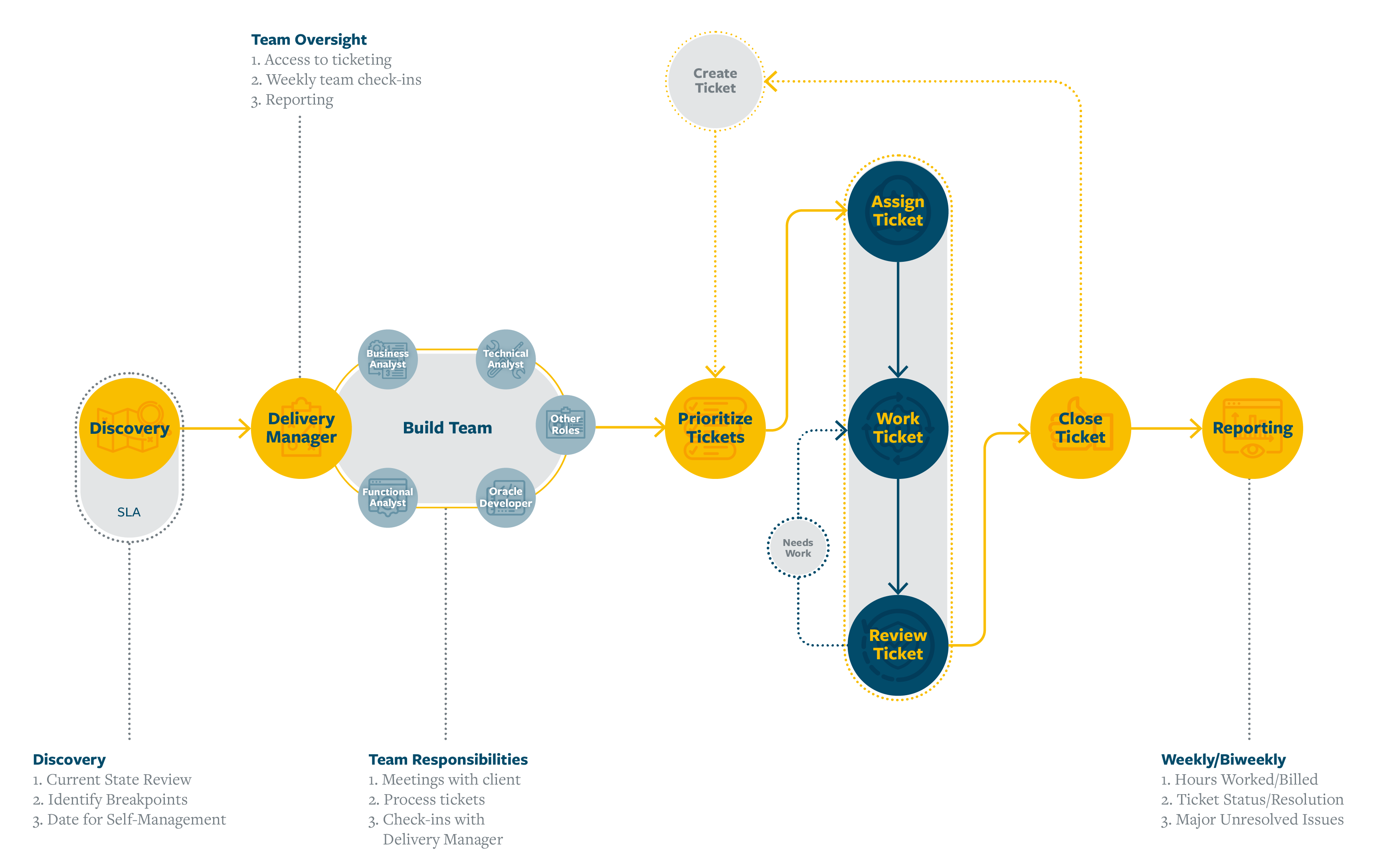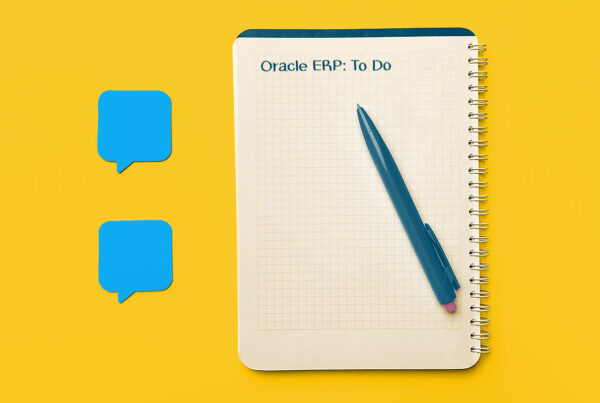It’s hardly a secret that the biggest challenge in implementing enterprise applications like Oracle Fusion Cloud is integration and configuration. As Oracle cloud consulting experts, we’ve seen that, even after a successful initial implementation, companies often struggle with five major elements: reports, interfaces, conversions, extensions, and workflows. (In fact, these elements are so notorious that they are often abbreviated as RICE-W.) Major issues in each of these elements can create significant barriers to achieving your critical business goals.
For complex operations, moving from implementation to self-management can take months — and sometimes more than a year! — of painstaking work optimizing Oracle Fusion Cloud ERP, EPM, SCM, and HCM applications. Across more than twenty years of business, we’ve learned the importance having a proven, repeatable process for managing these issues. In this post, we’ll cover the step-by-step process we use to help get teams to self-management faster and with fewer headaches.
Oracle Cloud Consulting: A Proven Process
We’re big fans of Stephen Covey, so it’s no surprise that our process for Oracle cloud consulting always begins with listening to understand. First, we delve into the client’s unique environment, identifying breakpoints and setting clear success criteria, including Service Level Agreements and timelines for getting them to self-management. Once we understand the client’s unique challenges and goals, we bring together a team of skilled Oracle cloud consultants for their distinct needs. This team’s efforts are always led by a dedicated Delivery Manager whose job is to ensure seamless communication, comprehensive reporting, and timely resolution of major issues.
Let’s delve into the details:
Learn What Matters (Discovery)
Our work begins before the assignment by ensuring that we fully understand the client’s environment, gaining a comprehensive understanding of their Fusion Cloud application(s) setup and requirements. We then identify potential issues or breakpoints in the system that may require support. Ultimately, we define what success looks like by specifying a Service Level Agreement (SLA) with expected ticket volumes, system availability, and response times. We also establish a timeline for transitioning the system to client self-management.
Build a Team
Our support services team always consists of a dedicated Delivery Manager and a team of specialized consultants, based on the client’s unique needs. These may include Business Analysts, Functional Analysts, Technical Analysts, Developers, and other experts proficient in the client’s Oracle applications. This diverse and skilled ensemble ensures a comprehensive approach to addressing client needs, from meticulous ticket management to effective communication and resolution of complex issues in the Oracle ecosystem.
- Delivery Manager: Our dedicated delivery manager provides an oversight role to the rest of the team. They manage the flow of tickets assigned to the Traust team and conduct weekly check-ins with both the delivery team and the client. In addition, the Delivery Manager provides regular reports on the team’s performance and project status.
- Delivery Team: The assigned specialists engage in regular meetings with members of the client team to understand their evolving needs, systematically process incoming tickets based on their nature and priority, and maintain regular check-ins with the Delivery Manager for coordination and issue resolution.
Manage Tickets
While this process will vary depending on each client’s needs and ticketing system, the delivery team follows a well-defined workflow to efficiently manage tickets, ensuring systematic prioritization, timely triage, effective issue resolution, and regular status updates.
- Prioritize: Prioritize tickets using a defined rubric based on urgency, impact, and other relevant factors.
- Assign: Evaluate and assign incoming tickets to the appropriate team members based on their expertise.
- Work: Begin working on assigned tickets according to established protocols, addressing the issues using the team’s collective skills and knowledge.
- Review & Report: Regularly update the issue status and report the results of the resolution process. If needed, provide additional work to meet client needs.
Communication & Reporting
In line with our commitment to transparency and client satisfaction, our Communication and Reporting process involves the regular generation and delivery of comprehensive reports, ensuring that clients are continuously informed about the progress of our work, including:
- Hours Worked/Billed: Track and report the hours worked on the project and ensure accurate billing.
- Ticket Status/Resolution: Communicate the current status and resolutions of ongoing tickets to the client and internal stakeholders.
- Major Unresolved Issues: Highlight and discuss any significant unresolved issues, seeking collaborative solutions during regular communication sessions.
Throughout the Oracle cloud consulting process, we keep focused not just on outputs but on outcomes. It’s easy to confuse effort with results. By always keeping the end in mind (another Covey-ism!) we ensure that we are delivering the operational results that matter to our clients.
From Implementation to Self-Management
Moving your operations to any new enterprise application — including Oracle Fusion Cloud apps — will always be a major undertaking. It takes a skilled team and a steady hand to help you navigate the choppy waters between implementation and self-management — and on to deliver real value for your business. Having a well-defined and proven process for getting there is the map you need to ensure a successful journey.
If you’re looking for help making the leap from implementation to self-management — or just want to learn more about Oracle cloud consulting services — schedule a consultation today.






